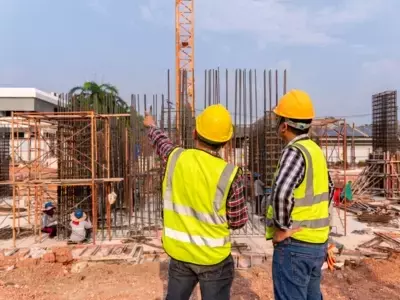
The ongoing conflict between Israel and Hamas has led to significant changes in the labor force within Israel's construction industry. With Palestinian workers restricted from entering Israel following the October 7, 2023 attack by Hamas, Indian workers have filled the void, transforming the linguistic and cultural landscape of construction sites. This shift highlights the economic opportunities available to Indian workers while also reflecting the broader geopolitical tensions in the Middle East.
Transformation of the Israeli Construction Industry
In the wake of escalating tensions in the Middle East, the once predominantly Arabic-speaking construction sites in Israel now echo with Hindi, Hebrew, and even Mandarin. The radical change in workforce demographics is a direct consequence of the security measures imposed after Hamas's unprecedented assault on Israel. Thousands of Palestinian construction workers were barred from entering Israel, creating an urgent need for alternative labor sources.
The Israeli government responded swiftly by welcoming Indian workers, who are drawn by the prospect of higher wages. In central Israel’s town of Beer Yaakov, Raju Nishad, an Indian worker, confidently stated that there was nothing to fear despite occasional sirens. He and his colleagues are focused on earning three times more than they would back home, saving for their families' futures. Approximately 16,000 Indian workers have arrived over the past year, with plans to bring thousands more.
Suresh Kumar Verma, another worker from Uttar Pradesh, echoed similar sentiments, emphasizing the importance of hard work for securing a better future. The Israeli construction industry has requested permission to hire up to one lakh Indian laborers as replacements. Two weeks ago, Uttar Pradesh Chief Minister Yogi Adityanath confirmed that 5,600 individuals from his state are currently working on construction projects in Israel, enjoying free food, accommodation, and a monthly salary equivalent to Rs 1.5 lakh, with full safety guarantees.
This influx of Indian workers not only addresses the immediate labor shortage but also symbolizes a new chapter in international labor migration, driven by economic incentives and geopolitical shifts.
From a journalist's perspective, this development underscores the interconnectedness of global economies and the resilience of workers seeking better opportunities. It also raises questions about the long-term implications for both Israel and India, as well as the potential impact on the Palestinian labor market. The adaptability of these workers in challenging circumstances serves as a testament to human perseverance and the pursuit of a better life.
